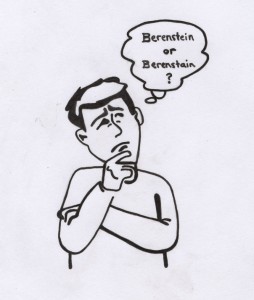Is it Berenstein Bears or Berenstain Bears?
December 2, 2016
The ideas of conspiracy theories and urban legends sound pretty ridiculous to most. Depending on how superstitious you are, you could believe anything you hear or disregard anything that isn’t true fact.
Yet some conspiracies have literal evidence to back them up. This sounds as far-fetched as the theories themselves, but the more you look into them, the more creeped out you get.
If you’ve ever heard of the Mandela Effect, you either think it’s the dumbest thing in the whole world, or you’re so creeped out by it that it gives you shivers. For the uninformed: the Mandela Effect is the idea that groups of people misremember the same event the same way, according to the website DebunkingMandelaEffects.com.
The Mandela Effect’s namesake comes from the theory of Nelson Mandela’s apparent death in prison. Thousands of people remember the announcement of Mandela’s passing while he was in prison and even remember watching the funeral service on TV. The amount of people who have literally no recollection of this is startling.
Another example of the phenomenon is that some people swear that they read the “Berenstein Bears” as a kid, while others are 100 percent positive that they read the “Berenstain Bears” (which is the correct spelling).
Arguably the most unsettling example of the Mandela Effect involves the song “We are the Champions” by Queen. While you may think the song ends with the iconic line “We are the champions of the world,” it doesn’t. Although this line is said twice in the song, it isn’t the ending of the classic song that many people recall it to be. It actually ends with “‘Cause we are the champions.”
If you’re rethinking your entire life, the Mandela Effect has done its job.
Students have extremely varying opinions on this crazy idea. Some students think it’s a complete sham.
“It’s so fake. It would be super creepy if it was real, but I know it’s not. It’s just for the internet to get freaked out,” junior Nicole DeCeglie said.
On the other hand some students fear for their sanity, like freshman Stevie Convertino, who expresses freely how much the Mandela Effect freaks him out. “It’s crazy,” he said. “It makes me question everything in my life.”
Unlike conspiracy theories (which most of the time have some telltale sign of truth, making it possible), urban legends are only that: legends.
One of the most famous urban legends comes from right here in N.J. The Jersey Devil is a flying bird-like creature with hooves. It’s allegedly been spotted across southern N.J., specifically in the Pine Barrens.
Similarly with the Mandela Effect, student reaction is extremely varying. Sophomore Jimmy Lynch isn’t falling for the legend one bit.
“I don’t believe it at all,” he said. “It’s physically, literally impossible.” But junior Danielle Kohler isn’t as optimistic. “I’m completely terrified,” she said.
While something like this can’t be proven, since there is no real proof, it still makes you wonder how someone could’ve possibly made up something so ridiculous. While conspiracy theories and urban legends may just be a bit of fun to joke about with friends, they really do make you wonder.


